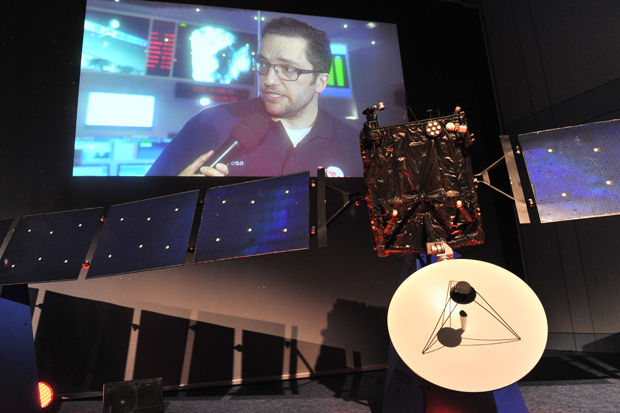What the shirt? A ridiculous, overblown allegation
November 18, 2014
Over this last week, the European Space Agency (ESA) successfully landed their probe, Philae, onto a comet in a dazzling display of how far humankind has come in just the last few decades.
It was little more than just a century ago when man first took to the skies, and now he dares to venture off into the unknown, to travel to worlds far away.
Of course, that wasn’t the big headline. Media outlets such as The Verge chose instead to comment on the shirt worn by project scientist Matt Taylor.
His shirt, which depicted caricatures of scantily clad women, was made up to be such a big deal that some even went as far as saying it kept women out of STEM fields. Pundits like those at The Verge called it “sexist” and “misogynistic.”
As a reminder, sexism involves discrimination toward a sex. Misogyny is contempt for women, so the trouble with the viewpoint expressed in the media begins at its very definition.
First of all, equating a shirt with contempt for women is outright dumb—there’s no two ways about it. I can’t imagine how Matt Taylor sought to malign women by wearing a shirt plastered with them.
His shirt was admittedly tacky, but that’s it. To say his shirt has held anyone back is simply ludicrous.
Second, it’s more likely that these authors don’t really care about issues effecting women, but were instead grasping onto the same buzzwords used by other recent viral videos (one of which was heavily edited, the other staged).
Of course, that’s not to say that misogyny and sexism are just buzzwords. Rather, they are misused and misapplied to situations and contexts where they don’t belong. These hacks don’t look at social issues, they construct them.
And that’s the problem with outrage culture and those who perpetuate it: They take away time and attention from real social injustices.
Unlike Nancy Pelosi, a real champion of women’s rights, you won’t see Chris Plante or Arielle Duhaime-Ross – the authors of The Verge article criticizing Taylor – campaigning on behalf of the Hispanic women who receive 56 cents on the dollar Caucasian men earn because that issue isn’t sexy and appealing to readers.
Instead of looking for solutions, people are being tricked into looking for problems. We’re not encouraging working together because we’re too busy trying to break each other down.
Here at Washington State, ASWSU has taken hold of a White House campaign and ran with it to end sexual violence, using multiple media outlets to ask viewers to support victims rather than stir up a witch-hunt for perpetrators.
That’s how outreach on social issues should be conducted—by bringing together every side to acknowledge a problem exists, then laying out a plan to fix it.
Feminist issues affect us all. When women are held back, so is society at large.
But we don’t need to engineer conflicts to justify taking action on economic inequality; to prevent assault, sexual, domestic, or otherwise; and we don’t need to pretend a single person’s fashion choice is responsible for the under-representation of women in many STEM fields.
What we do need is honest activism and a populace willing to acknowledge that inequality still exists in one form or another.
It’s time to dump the persecution complex, the petty complaints about shirts and staged viral videos, and get back to building a real egalitarian society.






















